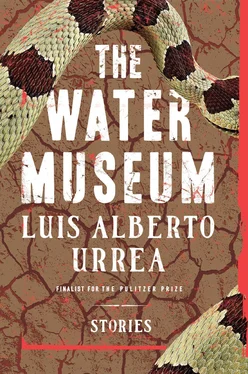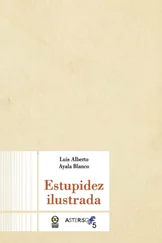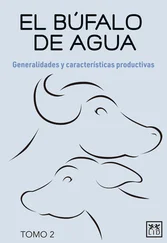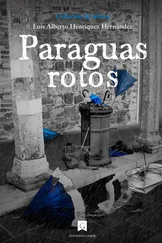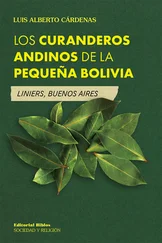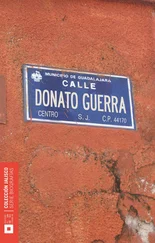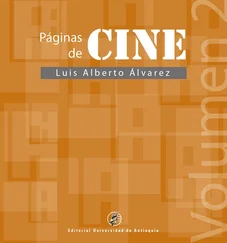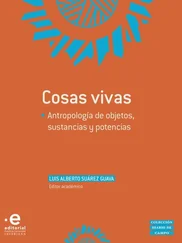More offended still, the crowd began to mumble.
Mr. Mendoza turned to me and said, “I see there are many wiggly feet present.”
“The man’s insane,” said Crispin.
Mr. Mendoza continued: “Social change and the nipping at complacent buttocks was my calling on earth. Who among you can deny that I and my brush are a perfect marriage? Who among you can hope to do more with a brush than I?”
He pulled the brush from under his coat. Several men shied away.
“I tell you now,” he said. “Here is the key to Heaven.”
He nodded to me once, and strode toward the door. Just before he passed into the night he said, “My work is finished.”
* * *
Tuesday morning we were up at dawn. Jaime had discovered a chink in fat Antonia’s new roof. Through it, we could look down into her bedroom. We watched her dress. She moved in billows, like a meaty raincloud. “In a way,” I whispered, “it has its charm.”
“A bountiful harvest,” Jaime said condescendingly.
After this ritual, we climbed down to the street. We heard the voices, saw people heading for the town square. Suddenly, we remembered. “Today!” we cried in unison.
The ever-growing throng was following Mr. Mendoza. His startling shock of white hair was bright against his dark skin. He wore a dusty black suit, his funeral suit. He walked into a corner of the square, knelt down, and pried the lid off a fresh can of paint. He produced the paintbrush with a flourish and held it up for all to see. There was an appreciative mumble from the crowd, a smattering of applause. He turned to the can, dipped the brush in the paint. There was a hush. Mr. Mendoza painted a black swirl on the flagstones. He went around and around with the legendary brush, filling in the swirl until it was a solid black O. Then with a grin, with a virtuoso’s mastery, he jerked his brush straight up, leaving a solid, glistening pole of wet paint standing in the air. We gasped. We clapped. Mr. Mendoza painted a horizontal line, connected to the first at a ninety-degree angle. We cheered. We whistled. He painted up, across, up, across, until he was reaching over his head. It was obvious soon enough. We applauded again, this time with feeling. Mr. Mendoza turned to look at us and waved once — whether in farewell or terse dismissal we’ll never know — then raised one foot and placed it on the first horizontal. No, we said. He stepped up. Fat Antonia fainted. The boys all tried to look up her dress when she fell, but Jaime and I were very macho because we’d seen it already. Still, Mr. Mendoza rose. He painted his way up, the angle of the stairway carrying him out of the plazuela and across town, over Bonifacio’s crumbling church, over the cemetery where he had never slept and would apparently never sleep. Crispin did good business selling beers to the crowd. Mr. Mendoza, now small as a high-flying crow, climbed higher, over the Baluarte and its deadly bridge, over El Yauco and Kennedy’s inverted nose, almost out of sight. The stairway wavered like smoke in the breeze. People were getting bored, and they began to wander off, back to work, back to the rumors. That evening, Jamie and I went back to fat Antonia’s roof.
It happened on June fifth of that year. That night, at midnight, the rains came. By morning, the paint had washed away.
2 Short was a tagger from down around 24th Street. He hung with the Locos de Veinte set, though he freelanced as much as he banged. His tag was a cloudy blue-silver goth II-SHT, and it went out on freight trains and trucks all over the fucking place. His tag was, like, sailing through Nebraska and some shit like that. Out there, famous, large.
2 Short lived with his pops in that rundown house on W. 20th. That one with the black iron spears for a fence. The old-timer feeds shorties sometimes when they don’t have anywhere to go — kids like Li’l Wino and Jetson. 2 Short’s pops is a veterano. Been in jail a few times, been on the street, knows what it’s like. He wants 2 Short to stay in school, but hey, what you gonna do? The vatos do what they got to do.
2 Short sometimes hangs in the backyard. He’s not some nature pussy or nothing, but he likes the yard. Likes the old orange tree. The nopal cactus his pops cuts up and fries with eggs. 2 Short studies shit like birds and butterflies, tries to get their shapes and their colors in his tag book. Hummingbirds.
Out behind their yard is that little scrapyard on 23rd. That one that takes up a block one way and about two blocks the other. Old, too. Cars in there been rusting out since ’68. Gutierrez, the old dude runs the place, he’s been scrapping the same hulks forever. Chasing kids out of there with a BB gun. Ping! Right in the ass!
2 Short always had too much imagination. He was scared to death of Gutiérrez’s little kingdom behind the fence. All’s you could see was the big tractor G used to drag wrecks around. The black oily crane stuck up like the stinger of the monsters in the sci-fi movies on channel 10. The Black Scorpion and shit.
The fence was ten feet tall, slats. Had some discolored rubber stuff woven in, like pieces of lawn furniture or something. 2 Short could only see little bits of the scary wrecks in there if he pressed his eye to the fence and squinted.
One day he just ran into the fence with his bike and one of those rotten old slats fell out and there it was — a passageway into the yard. He looked around, made sure Pops wasn’t watching, listened to make sure G wasn’t over there, and he slipped through.
Damn. There were wrecked cars piled on top of each other. It was eerie. Crumpled metal. Torn-off doors. Busted glass. He could see stars in the windshields where the heads had hit. Oh man — peeps died in here, homes.
2 Short crept into musty dead cars and twisted the steering wheels.
He came to a crunched ’71 Charger. The seats were twisted and the dash was ripped out. Was that blood? On the old seat? Oh man. He ran his hand over the faded stain. Blood.
He found her bracelet under the seat. Her wrist must have been slender. It was a little gold chain with a little blue stone heart. He held it in his palm. Chick must have croaked right here.
He stared at the starred windshield. The way it was pushed out around the terrible cracks. Still brown. More blood. And then the hair.
Oh shit — there was hair in strands still stuck to the brown stains and the glass. Long blond strands of hair. They moved in the breeze. He touched them. He pulled them free. He wrapped them around his finger.
That night, he rubbed the hairs over his lips. He couldn’t sleep. He kept thinking of the white girl. She was dead. How was that possible? How could she be dead?
He held the bracelet against his face. He lay with the hair against his cheek.
When he went out to tag two nights later, 2 Short aborted his own name. Die Hard and Arab said, “Yo, what’s wrong with you?”
But he only said, “The white girl.”
“What white girl, yo?”
But he stayed silent. He uncapped the blue. He stood in front of the train car. THE WHITE GIRL. He wrote. It went out to New York. He sent it out to Mexico, to Japan on a container ship. THE WHITE GIRL.
He wrote it and wrote it. He sent it out to the world. He prayed with his can. He could not stop.
THE WHITE GIRL.
THE WHITE GIRL.
THE WHITE GIRL.
It sounded like a vacation spot: Pelican Bay.
But it was the opposite of that, and Joey’s dad was going to be spending the next thirty-five years there in a cage. He’d left all his shit behind, and Joey spent his free time in the garage, sorting it out. Free time — what a laugh. Most of his time was free. That was part of the problem, though Joey knew his real job was keeping Moms afloat. When his dad went down, Moms got a tattoo right on her collarbone: WYATT. She cried alone when she thought Joey wasn’t listening. Crying and the clinking of ice in her highball glass — Joey’s lullaby.
Читать дальше
